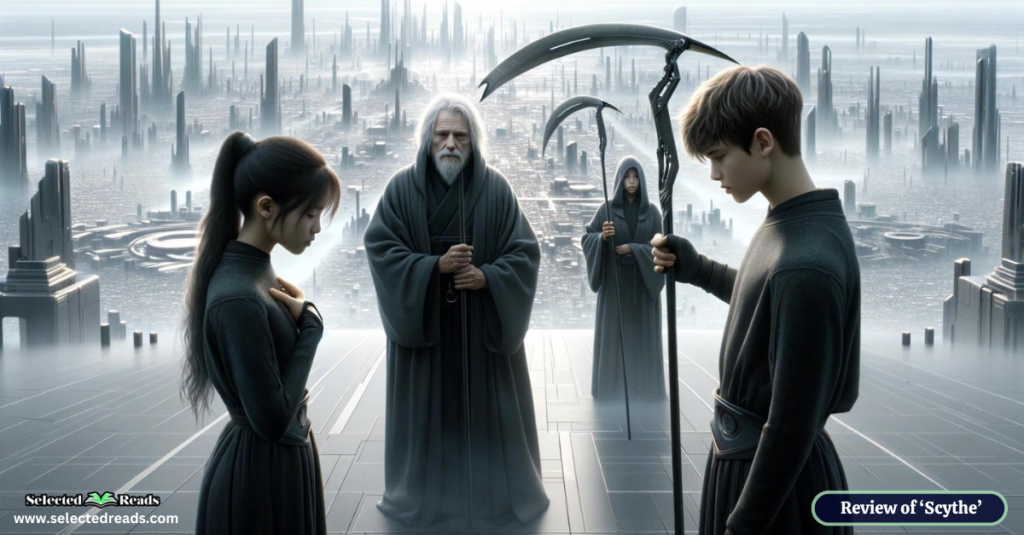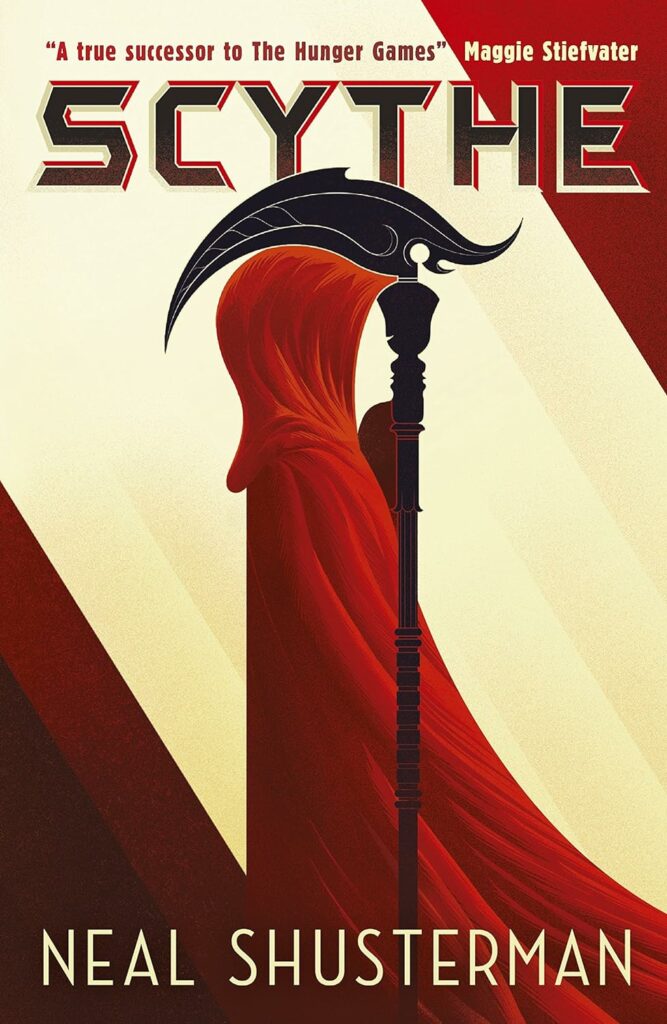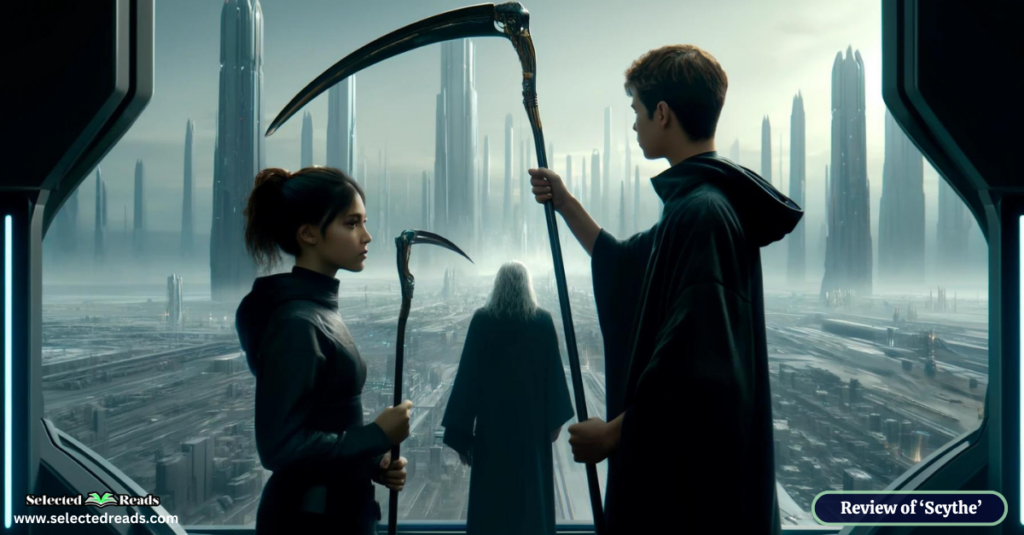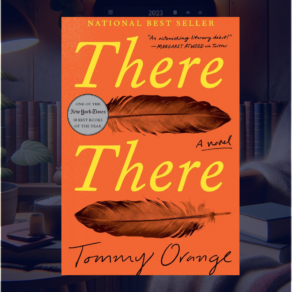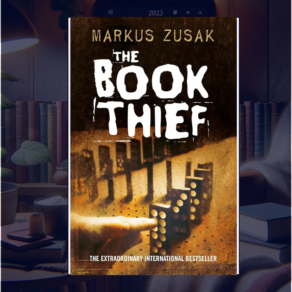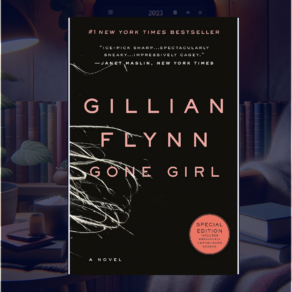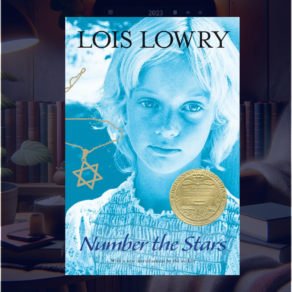Today, we delve into “Scythe” by Neal Shusterman, a compelling novel situated within the realms of dystopian fiction. This intriguing work explores a future where mortality has been eradicated, and the only death is administered by professional Scythes. The aim of this post is to give you a comprehensive overview of the book’s core elements without venturing into spoiler territory.
Our exploration will be structured as follows: initially, I will provide a detailed summary of the plot to set the stage. Following that, we’ll examine the key characters who drive the narrative. To conclude, I’ll present a selection of thought-provoking questions perfect for book club discussions or individual contemplation.
Scythe Book Summary
“Scythe” is set in a dystopian future where humanity has conquered all natural causes of death. With the eradication of disease, war, and crime, the population is controlled by Scythes, individuals entrusted with the authority to end life. These Scythes “glean” people to maintain the balance of the world’s population.
The story follows two teenagers, Citra Terranova and Rowan Damisch, who are unexpectedly chosen as apprentices to a venerable Scythe named Faraday. Neither Citra nor Rowan has any initial desire to enter the macabre profession, but they quickly realize that they must master the “art of killing” to survive the political intrigue within the Scythedom.
As Citra and Rowan train under Scythe Faraday, they learn the moral complexities of taking a life and are taught to do so with compassion and respect. Their training includes not only the physical aspects of gleaning but also the emotional and ethical ramifications. Both apprentices develop a deep understanding of the gravity of their responsibilities.
Photo: Amazon
The plot thickens when Scythe Faraday mysteriously self-gleans, leaving Citra and Rowan in a precarious position. They are then separated and apprenticed to other influential Scythes—Citra to Scythe Curie, also known as the “Grande Dame of Death,” and Rowan to Scythe Goddard, a radical who enjoys the act of killing and seeks to transform the Scythedom to embrace his lenient and often cruel gleaning methods.
As Citra and Rowan diverge in their training, the differences in their mentors’ philosophies become stark. Citra continues to respect the dignity of life, while Rowan is drawn deeper into the violent and corrupt aspects of the Scythedom under Goddard’s influence.
The apprenticeship culminates in a chilling twist: only one apprentice will be ordained as a Scythe, and their first task will be to glean the other. As Citra and Rowan struggle against the increasingly corrupt system and confront their feelings about their roles, they face life-or-death decisions that will not only determine their own fates but also the future ethical landscape of the Scythedom.
The book concludes with intense moral questions about life, death, and power, leaving Citra and Rowan on the brink of decisions that could reshape the world they live in.
Scythe Book Characters
In “Scythe,” the main characters are Citra Terranova and Rowan Damisch, who are central to the story as apprentices to the Scythes. Here’s a brief overview of them and other significant characters:
- Citra Terranova: A smart and determined teenager, Citra is initially reluctant to become a Scythe but takes to the moral teachings of the role with a strong sense of justice. She is selected for her potential to handle the responsibilities of a Scythe with integrity.
- Rowan Damisch: Rowan is presented as a somewhat disillusioned but thoughtful character who grapples deeply with the moral implications of gleaning. His journey through the apprenticeship, especially under the radical Scythe Goddard, tests his ethics and character.
- Scythe Faraday: A venerable Scythe who chooses Citra and Rowan as his apprentices. Faraday is a firm believer in the ethical and compassionate approach to gleaning, teaching his apprentices to respect life and their duty.
- Scythe Curie: Also known as the “Grande Dame of Death,” Curie is an experienced and wise Scythe who becomes Citra’s mentor after Faraday’s death. She is characterized by her moral fortitude and serves as a moral anchor for Citra.
- Scythe Goddard: The antagonist of the story, Goddard represents a radical faction within the Scythedom that enjoys the power and privilege that comes with the role. He mentors Rowan, exposing him to a more brutal and less ethical way of gleaning.
- High Blade Xenocrates: He is the head of the MidMerica region’s Scythes, responsible for overseeing the Scythes in that area. Xenocrates plays a significant role in the politics and governance of the Scythedom.
Related: Never Let Me Go Summary and Characters
Scythe Book Questions
Here are several that cover a range of topics from thematic elements to character development:
- Ethical Considerations: How does the concept of scythes as sanctioned killers affect the society depicted in the book? Discuss the ethical implications of having humans control over life and death.
- Character Development: Compare and contrast Citra’s and Rowan’s views on morality at the beginning of the book and how they evolve by the end. What key experiences contribute to their development?
- Role of Scythes: In a world without natural death, what role do Scythes play beyond controlling population? How do their personal philosophies impact their methods and choices?
- Themes of Power and Corruption: How does power corrupt in the world of Scythes, and what does the book suggest about the nature of power in human societies?
- Influence of Mentors: Examine how the differing philosophies of Scythe Faraday, Scythe Curie, and Scythe Goddard influence Citra and Rowan. How does mentorship shape their approaches to their duties?
- Technology’s Impact on Society: Discuss the impact of the Thunderhead, the artificial intelligence that governs this society. How does it shape the lives of the characters and the societal structure?
- Concept of Gleaning: Analyze the practice of gleaning in the context of the book. How do the scythes’ individual methods of choosing whom to glean reflect their characters and beliefs?
- Moral Dilemmas: What moral dilemmas do Citra and Rowan face, and how do they resolve them? Are their actions justified?
- Future Societies: What aspects of the society in “Scythe” can be seen as utopian, and which are dystopian? Use examples from the book to support your views.
- Symbolism and Motifs: Identify and discuss any symbols or recurring motifs throughout the book. What do they represent, and how do they contribute to the overall message of the story?
Related: Fahrenheit 451 Summary
Final thoughts
To conclude, I hope you’ve found this brief exploration of “Scythe” engaging and insightful. This novel is a masterful blend of dystopian elements and moral questions that will leave you pondering long after the last page. If you haven’t yet experienced this gripping tale by Neal Shusterman, I highly recommend picking it up. It promises not only a thrilling read but also a deep dive into the ethical dilemmas of a world where death must be deliberately dealt by human hands.



